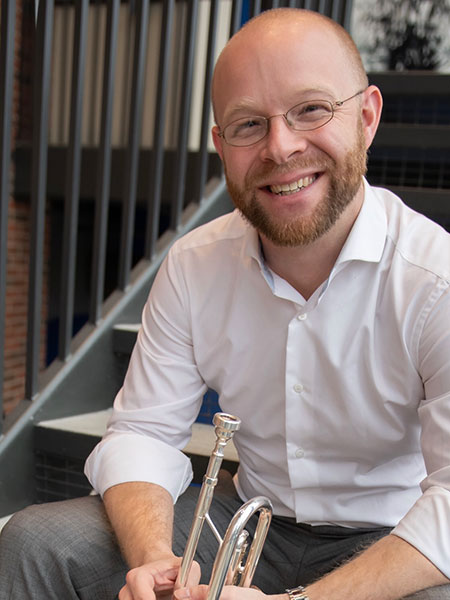

"Dr. Andrew Harms is more than just an A+ instructor, he is truly a teacher who meets the students where they are at and pushes them to grow. He engages the kids to go beyond just their instrument and learn to appreciate music. During COVID, Dr. Harms went way above and beyond for his students and really kept music in my child’s life all year. I don’t know where we would have been without him this past year, which speaks volumes to his dedication to the students he teaches. He is professional and kind. Dr. Harms is the place to go!"
~ Parent of student age 15
Dr. Andrew Harms
Trumpet, French Horn, Trombone, Tuba, Euphorium
Dr. Harms received his B. Mus from Missouri State University, his MM from the University of Missouri, and his DMA from the College-Conservatory of Music, University of Cincinnati.
He currently serves on the faculty of Colby College in Waterville, ME, as Artist Instructor of Trumpet, was previously faculty at U Maine-Orono, and is an active teacher and clinician in the New England region, including at many arts camps. He has worked extensively with students on all brass instruments, including French horn, baritone/euphonium, trombone, bass trombone, and tuba. He has had students accepted to All-State ensembles on every brass instrument.
Dr. Harms has received recognition from several national organizations, including the International Trumpet Guild, National Trumpet Competition, and the Music Teachers National Association Chamber Music Competition. He is a published author on brass pedagogy, serves on the board of the New England Brass Band, and has partnered with education programs for advanced college students and professionals, including with David Bilger to produce “Dave’s Dojo.”
"Dr. H" is a member of the Bangor Symphony and Vermont Symphony Orchestras, and appears regularly with the Rhode Island Philharmonic, the Portland Symphony Orchestra, the East Connecticut Symphony Orchestra, and others. He been featured soloist with the Rhode Island Philharmonic, the Brookline Symphony Orchestra, and the New England Brass Band. He has also played with the Philadelphia Orchestra, the Atlanta Symphony, the Cincinnati Symphony, and the Miami Symphony.
He is Artistic Director of the Spitfire Music Consortium, which offers undergraduate career advising and instruction, college preparation, and curriculum advising for clients throughout the NE area, including UNH and U Maine.
Meet Andrew
- How/what age did you start your instrument?
I started at age 11/5th grade. - Did you come from a musical family?
No! I have a doctorate in Music, and my parents didn’t even finish high school. - Best, funniest or worst musical memory from childhood?
One of my favorite musical memories is hiking one day after school to the local Barnes and Noble (when those still existed) to read books. I stumbled across a CD of the Boston Pops under John Williams playing Star Wars on the sample listening device. I loved Star Wars, and being from a very rural, very poor community, I had never heard playing like that, anywhere. It is one of the moments that inspired me to become a musician. Imagine my joy to play Star Wars soundtracks under John Williams, 20 years later. - A highlight or two from your performing career:
Other than the one above, there are two that stand out. First, going into my senior year of high school, I decided I wanted to make the District and State ensembles, which nobody in my band section had done in a decade or more. Without telling my parents, I quit my job, bought a professional instrument, took lessons, and I practiced five hours per day that summer. I made 1st chair at Districts, and 3rd at State. Spending a week at the state festival and being exposed to college teachers and like-minded musicians was life-changing.
Second, not playing but certainly music related, was when my mentor, the principal trumpet of the Philadelphia Symphony, asked me to co-found his program with him in Miami. I was both floored, and honored, and our program is just getting off the ground. - What do you love about teaching?
Photographer David Duchemy talks about the way our work sends waves across the universe, like ripples from a rock thrown in a pond. My favorite thing about teaching is knowing that my words and actions will resonate in the minds of my students their whole lives, and hopefully become wisdom they can apply and pass on. This process goes farther than fancy cars and iPhones, and is one of the best reasons to study music, in my opinion. I have had several important mentors that continue to play a role in my life, and love being in the middle of that cycle. - What would you like your students to know about you?
My students have NO question that I am passionate about music, and believe in its value with all of my faculties. Like a stock that investors don’t understand, music and the arts is drastically undervalued by society, and in time people will see it more the way I do (they are starting to!). It can challenge our brains to think in a way similar to differential calculus, but at a much younger age and with an element of motor skills and coordination. Like calculus and acting combined! I do not hide my beliefs about music’s importance, so students should come to lessons expecting to be challenged to think, and to walk away with new perspectives. - Can you share a non-musical fun fact about you?
I have a lot of disjunct hobbies, but one that is a little unusual is that I am an avid watch collector, builder, and restorer. I collect modern Omegas, IWCs, Tudors, as well as World War II-era field and pilot watches. I have built mechanical watches and clocks from parts, and have restored several vintage Omegas to like-new condition.


